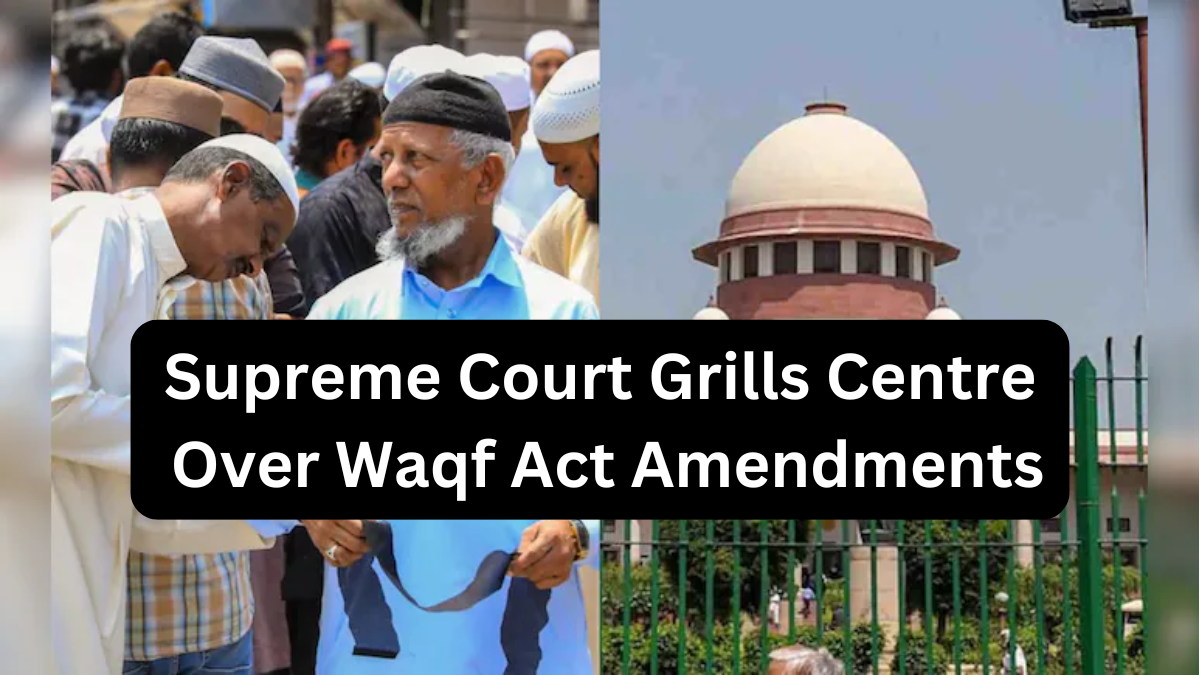In a crucial legal development, the Supreme Court of India grilled the Central Government over the newly amended Waqf Act, focusing on contentious aspects such as ‘Waqf by user’ and the inclusion of non-Muslims in the Central Waqf Council. The hearing witnessed sharp observations from the bench and forceful arguments from petitioners, indicating the deep constitutional implications of the amendments.

Background: Why the Waqf Amendment Act is Being Challenged
The court is currently hearing 73 petitions that challenge the legality and constitutionality of the Waqf Amendment Act, which has sparked debates and protests in several parts of the country.
Key concerns revolve around:
-
Freedom of religion and religious autonomy
-
Documentation requirements for historical waqf properties
-
Government overreach in religious matters
Supreme Court’s Key Questions to the Centre
A bench led by Chief Justice Sanjiv Khanna, along with Justice Sanjay Kumar and Justice KV Vishwanathan, put forth critical questions to the Central Government. These included:
-
Is it constitutionally valid to invalidate waqf status for properties that lack historical documentation?
-
How can non-Muslims be appointed to the Central Waqf Council without allowing reciprocal representation in other religious boards?
-
Should these petitions be transferred to High Courts, or can the Supreme Court hear them directly?
Arguments Presented by the Petitioners
| Advocate | Arguments Presented |
|---|---|
| Kapil Sibal | Claimed that the Act violates Article 26 of the Constitution which ensures the right to manage religious affairs. |
| Criticized the role of the Collector, saying it merges executive and judicial functions unconstitutionally. | |
| Strongly opposed changes to ‘Waqf by user’, citing its longstanding recognition in Islamic law. | |
| Abhishek Manu Singhvi | Pointed out that 4 lakh out of 8 lakh waqf properties are based on user and tradition. |
| Clarified that petitioners are seeking a partial stay, not to strike down the entire Act. |
Kapil Sibal made a striking point:
“The problem is, if a waqf was created 3,000 years ago, they will ask for the deed.”
Understanding ‘Waqf by User’
The concept of ‘Waqf by user’ refers to land or property that has been used continuously for religious or charitable purposes and has historically been accepted as waqf, even without legal paperwork.
However, the new amendments:
-
Exclude disputed or government-owned land from this recognition.
-
Require proof of long-standing use, which is difficult for older institutions like mosques established centuries ago.
Supreme Court’s Stand: Constitutional and Historical Lens
The Supreme Court expressed concern that:
-
Declaring court judgments void through legislation would set a dangerous precedent.
-
It is unreasonable to expect documentation for 13th to 15th-century mosques.
-
While misuse of the Waqf Act has occurred, genuine waqfs must be protected.
The Chief Justice remarked:
“If you undo ‘Waqf by user’, it will undo history. These waqfs are recognized even by Privy Council judgments.”
Debate Over Waqf Council’s Composition
Another contentious issue was the inclusion of non-Muslims in the Central Waqf Council. The Chief Justice directly asked the government:
“Are you saying you will allow Muslims to be part of Hindu endowment boards? Say it openly.”
This statement highlighted the perceived asymmetry and religious imbalance in the new law’s implementation.
Centre’s Defence of the Amendments
Representing the government, Solicitor General Tushar Mehta stated that:
-
The law was passed following detailed debate in Parliament.
-
A Joint Parliamentary Committee vetted and recommended the changes.
-
The law passed through both houses of Parliament with full procedural compliance.
However, the Court urged Mr. Mehta to specifically address the concerns around ‘Waqf by user’ and the implications for historically recognized properties.
Looking Ahead
The Supreme Court emphasized that:
-
The positive aspects of the amended Act must be acknowledged.
-
However, constitutional and religious sensitivities must also be respected.
The matter will be taken up again in court tomorrow, where further clarification is expected on the government’s stance and possible revisions to the Act.
FAQs:
1. What is the Waqf Amendment Act?
The Act introduces changes in how waqf properties are defined and regulated, including rules for identifying waqf properties and changes in council representation.
2. What does ‘Waqf by user’ mean?
It is a legal doctrine that allows property to be treated as waqf based on long-term public religious or charitable use, even without formal registration or documentation.
3. Why is there controversy over the inclusion of non-Muslims in the Waqf Council?
Critics argue that it infringes on religious autonomy. The Supreme Court raised the question of fairness, asking if Muslims would be allowed similar representation in Hindu religious boards.
4. Is the entire Waqf Amendment Act being challenged?
Not entirely. Petitioners are specifically challenging provisions they believe violate constitutional principles, particularly around ‘Waqf by user’ and governance issues.
Click here to learn more
Pari is a passionate writer known for captivating stories that blend imagination and reality. Inspired by travel, history, and everyday moments, Pari crafts narratives that resonate deeply with readers.